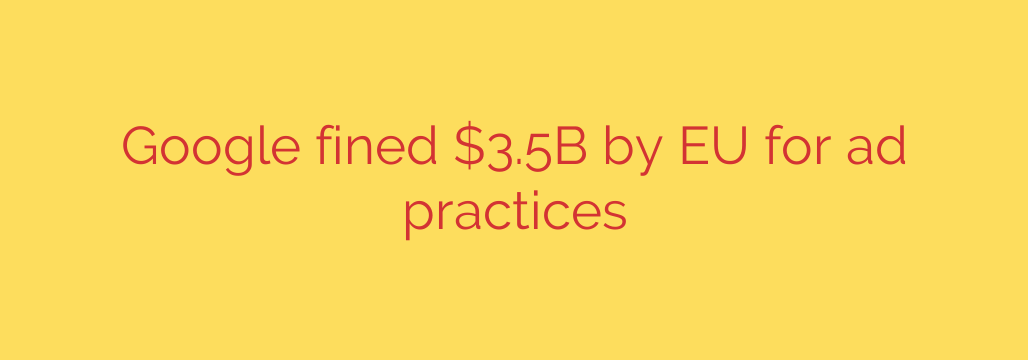
EU Hits Google With Massive Antitrust Fine Over Ad Practices: What You Need to Know
The European Commission has once again taken a firm stance against anti-competitive behavior in the tech industry, levying a substantial €1.49 billion (approximately $1.7 billion) fine against Google for abusing its dominant market position in online search advertising.
This penalty targets specific practices related to the company’s AdSense business, which for years placed restrictive conditions on third-party websites, effectively blocking out rivals and stifling competition. This isn’t just about a financial penalty; it’s a landmark decision that underscores a global shift toward holding tech giants accountable for fair play in the digital marketplace.
The Core Issue: Abusing Market Dominance with AdSense
At the heart of the investigation is Google’s “AdSense for Search” platform. This service allows third-party websites—such as online retailers, news publications, and travel blogs—to place a Google search bar on their own pages. When a user performs a search, the results page includes search ads, and Google shares the resulting revenue with the website owner.
Given Google’s overwhelming market share in search advertising, this became an essential tool for websites looking to monetize their traffic. However, regulators found that Google used this dominance to impose illegal, anti-competitive restrictions on these third-party sites.
The European Commission’s investigation revealed that Google engaged in several harmful practices over a decade:
- Imposing Exclusivity Clauses: Starting in 2006, Google included clauses in its contracts that prohibited publishers from placing any search ads from competitors on their search results pages. This locked rivals out of the market entirely.
- Forcing Premium Placement: From 2009, Google began replacing total exclusivity with “premium placement” clauses. This meant publishers were required to reserve the most profitable and visible space on their results pages for Google’s ads and had to take a minimum number of ads from Google.
- Requiring Approval for Competitor Ads: The contracts also included clauses that required publishers to get written permission from Google before making any changes to how competing ads were displayed. This gave Google control over how, and if, its rivals could even appear on the same page.
These actions effectively cemented Google’s dominance, making it nearly impossible for other search ad providers to compete on merit. Publishers had little choice but to comply, and consumers were ultimately harmed by a lack of choice and innovation in the market.
Part of a Broader Pattern of Scrutiny
This fine is not an isolated event. It represents the third major antitrust penalty imposed on Google by the EU in recent years. This follows a record €4.34 billion fine related to its Android operating system and a €2.42 billion fine for unfairly promoting its own shopping service in search results.
Together, these rulings paint a clear picture of a regulatory body determined to dismantle what it sees as a pattern of behavior that leverages dominance in one area to gain an unfair advantage in another. The message is clear: operating as a market leader comes with a special responsibility to ensure a level playing field.
Key Takeaways and What This Means for Businesses
For businesses, advertisers, and publishers, this decision has significant implications and offers valuable lessons for navigating the digital landscape.
- A More Open Advertising Ecosystem: The primary goal of the ruling is to restore competition. Publishers now have more freedom to work with multiple ad providers, potentially leading to better revenue-sharing deals and more diverse monetization strategies.
- Diversification is Critical: This case serves as a powerful reminder for advertisers not to become overly reliant on a single platform. Smart marketers should diversify their ad spend across different channels, including Microsoft Advertising, social media platforms, and other emerging networks. This reduces risk and can often unlock new, untapped audiences.
- The Regulatory Landscape is Evolving: Tech giants are no longer operating in an unregulated space. Businesses must stay informed about evolving competition and data privacy laws (like GDPR and CCPA) as they directly impact digital marketing and data strategies.
- Focus on Building Direct Relationships: In an era of increasing platform scrutiny, owning your audience is more important than ever. Focus on building first-party data through email lists, customer loyalty programs, and high-quality content. This creates a direct line to your customers that isn’t dependent on the whims of third-party platforms.
Ultimately, the EU’s enforcement actions aim to reshape the digital advertising world into a fairer, more competitive environment. While Google remains the dominant force, the door is now more open for innovation and choice, benefiting everyone from small publishers to global brands.
Source: https://www.bleepingcomputer.com/news/google/eu-fines-google-35-billion-for-anti-competitive-ad-practices/








